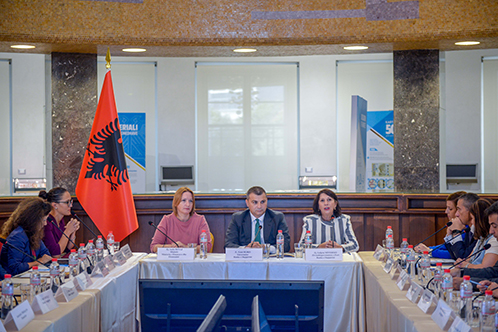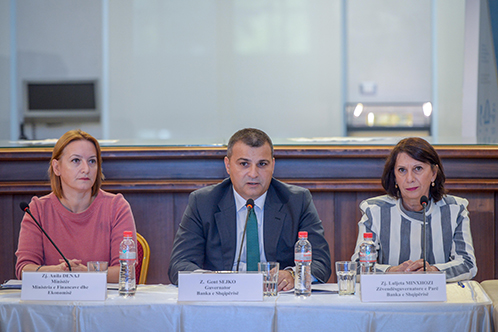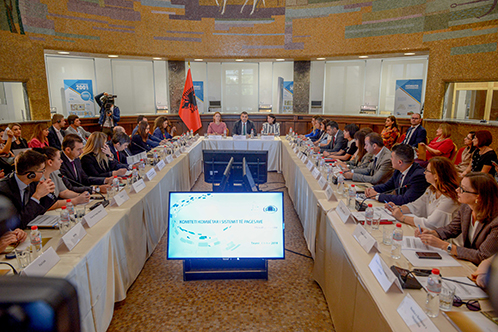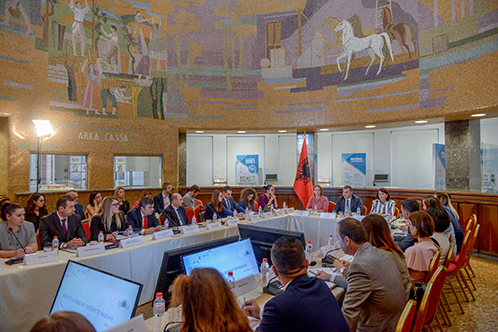BANK OF ALBANIA
PRESS RELEASE
Governor Sekjo: Address to the 5th meeting of the National Payment System Committee
Publication date: 01.10.2019
Dear Minister Denaj,
Dear members of the National Payment System Committee,
Dear ladies and gentlemen,
Please allow me, at the outset, to express on behalf of the Bank of Albania our sincere appreciation for your continuous commitment and collaboration to achieving common objectives in the field of payments and beyond. The collaboration and discussion of development alternatives among the main market actors is considered as one of the main pillars for the success of the undertaken reforms.

In this light, since 2015, the Bank of Albania has organised the National Payment System Committee (NPSC) to support and contribute to increasing the security, stability and efficiency of the national payment system in Albania. These objectives are rather important for the implementation of our monetary policy and for the financial and economic stability of Albania, by building up firm foundations for development and welfare.
I would like to highlight that the NPSC is set up based on best international and European Union practices. It is a strategic, consulting and communicating entity, whose decisions support the activities of the participating institutions in the area of payments. In this framework, it is worthy to note that during the five years of its existence, crucial results have been achieved, most noteworthy the approval of the National Retail Payments Strategy (2018-2023).
The insofar findings clearly evidence the low financial inclusion of the Albanian population, not only compared with the European Union, but also with regional countries. All these are reflected in a high use of cash in the Albanian economy. Empirical studies by the Bank of Albania in collaboration with the World Bank Group show that the use of cash in economy, beyond the diminishing effects on the mechanisms of the Bank of Albania used for maintaining price stability and safeguarding financial stability, and supporting economic development, has a real cost from its use as a means of payment, amounting to more than 1% of GDP. Furthermore, the use of cash may be seen as a promoter of informality in economy.

Hence, this strategy aims to establish a contemporary and comprehensive retail payments market, supported by safe and efficient infrastructures, as well as by a wide range of payments instruments and services that fulfil the needs of financially capable users across the country.
This strategy, compiled with the valuable support of the World Bank Group, is the outcome of a long and analytical study and aims to best address the needs of the domestic market.
The realisation of this vision is assessed to be materialised through a set of legal, regulatory and infrastructural developments, which promote technological developments and innovation in the payments market.
In this regard, I would like to point out that the inclusion of information technology developments in financial services is increasingly drawing the attention of central banks, regulatory and supervisory authorities worldwide. Both international and domestic practices show that a comprehensive approach through collaboration considerably supports the achievement of effective and optimal results.

A concrete example of aligned efforts in this regard is exactly the one in the field of payments. In this field, the measures undertaken by the Government of Albania for the digitalisation of government services and recently for the draft-law “on billing and monitoring system of circulation”, which aims at increasing and strengthening the fiscalisation of the Albanian economy, appear to fully harmonise with the initiatives undertaken by the Bank of Albania, through the National Payment System Committee, for modernising the payment market and increasing financial inclusion.
The Bank of Albania has worked on drafting a new legal and regulatory framework, which aims at promoting digitalisation in the area of payment services. The compilation of the draft-law “On payment services” is considered as the first and crucial step in the framework of reforming and digitalising the small-value payments.
In concrete terms, this draft-law is seen to considerably encourage the competition in the market, by providing a crucial contribution to the establishment of low cost services and easily accessible by the large public.

Dear ladies and gentlemen,
The promotion of the above objectives is not only important for the functions of the Bank of Albania as the monetary authority, but it also provides an essential contribution to the economic development and welfare of the general public.
All these developments would provide the expected effects only if they are based on measures in the framework of financial education of the public. Being aware that financial literacy constitutes a significant instrument for promoting the development of the market, for more than a decade, the central bank has been engaged in designing and developing educational programmes to address the needs of groups of interest.
It is not a coincidence that the focus of central bank, in both, advanced and developing countries, is on enhancing financial literacy. Numerous studies have shown that financial education has multiple benefits. Being familiar with the basic financial and economic concepts, appropriately knowing and using banking products and financial instruments as well as the ability to manage personal and household finances, are crucial to achieve individual, and societal welfare.
On the other hand, a well-informed financial decision of households helps central banks to accomplish their mandate in achieving price stability and safeguarding financial stability. A better understanding of monetary policy accelerates its effective transmission to the real economy. Meanwhile, the quality of decisions for financing or investment has a direct impact on the stability of the whole financial system.
The Bank of Albania has been intensively involved in financial education over the years and this long-standing experience has clearly identified the need for a coordinated initiative at national level up to the upgrading this objective to a reform level of crucial importance for the country.
For this purpose, the Bank of Albania, driven by the requirements of other authorities, and of market stakeholders, considered as indispensable the drafting of a National Strategy for Financial Education that you are also going to address in this meeting and the real outcomes in this regard are expected to become materialised very soon.
We are confident that such a strategic document - tailored for the local financial education context - would help through joint and coordinated actions and resources of various stakeholders in increasing effectiveness of objectives for cultivating a financial literacy in the Albanian society. I invite, therefore, all the participating institutions to engage and contribute actively to this initiative.
Concluding, I sincerely hope that this NPSC meeting will actively discuss and deliberate on various issues that need to be addressed about relevant topics.
Thank you for your attention!

 Twitter
Twitter
 Youtube
Youtube
 Facebook
Facebook
 Flickr
Flickr
 RSS
RSS
 Subscribe
Subscribe
 Feedback
Feedback